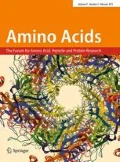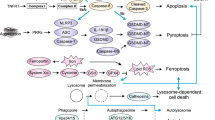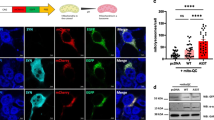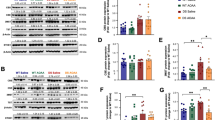Abstract
There is a substantial body of literature, which has demonstrated that creatine has neuroprotective effects both in vitro and in vivo. Creatine can protect against excitotoxicity as well as against β-amyloid toxicity in vitro. We carried out studies examining the efficacy of creatine as a neuroprotective agent in vivo. We demonstrated that creatine can protect against excitotoxic lesions produced by N-methyl-d-aspartate. We also showed that creatine is neuroprotective against lesions produced by the toxins malonate and 3-nitropropionic acid (3-NP) which are reversible and irreversible inhibitors of succinate dehydrogenase, respectively. Creatine produced dose-dependent neuroprotective effects against MPTP toxicity reducing the loss of dopamine within the striatum and the loss of dopaminergic neurons in the substantia nigra. We carried out a number of studies of the neuroprotective effects of creatine in transgenic mouse models of neurodegenerative diseases. We demonstrated that creatine produced an extension of survival, improved motor performance, and a reduction in loss of motor neurons in a transgenic mouse model of amyotrophic lateral sclerosis (ALS). Creatine produced an extension of survival, as well as improved motor function, and a reduction in striatal atrophy in the R6/2 and the N-171-82Q transgenic mouse models of Huntington’s disease (HD), even when its administration was delayed until the onset of disease symptoms. We recently examined the neuroprotective effects of a combination of coenzyme Q10 (CoQ10) with creatine against both MPTP and 3-NP toxicity. We found that the combination of CoQ and creatine together produced additive neuroprotective effects in a chronic MPTP model, and it blocked the development of alpha-synuclein aggregates. In the 3-NP model of HD, CoQ and creatine produced additive neuroprotective effects against the size of the striatal lesions. In the R6/2 transgenic mouse model of HD, the combination of CoQ and creatine produced additive effects on improving survival. Creatine may stabilize mitochondrial creatine kinase, and prevent activation of the mitochondrial permeability transition. Creatine, however, was still neuroprotective in mice, which were deficient in mitochondrial creatine kinase. Administration of creatine increases the brain levels of creatine and phosphocreatine. Due to its neuroprotective effects, creatine is now in clinical trials for the treatment of Parkinson’s disease (PD) and HD. A phase 2 futility trial in PD showed approximately a 50% improvement in Unified Parkinson’s Disease Rating Scale at one year, and the compound was judged to be non futile. Creatine is now in a phase III clinical trial being carried out by the NET PD consortium. Creatine reduced plasma levels of 8-hydroxy-2-deoxyguanosine in HD patients phase II trial and was well-tolerated. Creatine is now being studied in a phase III clinical trial in HD, the CREST trial. Creatine, therefore, shows great promise in the treatment of a variety of neurodegenerative diseases.
Similar content being viewed by others
References
Adhihetty PJ, Beal MF (2008) Creatine and its potential therapeutic value for targeting cellular energy impairment in neurodegenerative diseases. Neuromol Med 10:275–290
Adhihetty PJ, Irrcher I, Joseph AM, Ljubicic V, Hood DA (2003) Plasticity of skeletal muscle mitochondria in response to contractile activity. Exp Physiol 88:99–107
Aksenov M, Aksenova M, Butterfield DA, Markesbery WR (2000) Oxidative modification of creatine kinase BB in Alzheimer’s disease brain. J Neurochem 74:2520–2527
Andreassen OA, Dedeoglu A, Ferrante RJ, Jenkins BG, Ferrante KL, Thomas M et al (2001) Creatine increase survival and delays motor symptoms in a transgenic animal model of Huntington’s disease. Neurobiol Dis 8:479–491
Andres RH, Ducray AD, Schlattner U, Wallimann T, Widmer HR (2008) Functions and effects of creatine in the central nervous system. Brain Res Bull 76:329–343
Arrasate M, Mitra S, Schweitzer ES, Segal MR, Finkbeiner S (2004) Inclusion body formation reduces levels of mutant huntingtin and the risk of neuronal death. Nature 431:805–810
Baines CP, Kaiser RA, Purcell NH, Blair NS, Osinska H, Hanbleton MA et al (2005) Loss of cyclophilin D reveals a critical role for mitochondrial permeability transition in cell death. Nature 434:658–662
Beal MF (1996) Mitochondria, free radicals, and neurodegeneration. Curr Opin Neurobiol 6:661–666
Beal MF (2001) Experimental models of Parkinson’s disease. Nat Rev Neurosci 2:325–334
Beal MF (2009) Therapeutic approaches to mitochondrial dysfunction in Parkinson’s disease. Parkinsonism Relat Disord 15:S189–S194
Beal MF, Ferrante RJ (2004) Experimental therapeutics in transgenic mouse models of Huntington's Disease. Nat Rev Neurosci 5:373–384
Beal MF, Brouillet E, Jenkins BG, Ferrante RJ, Kowall NW, Miller JM, Storey E, Srivastava R, Rosen BR, Hyman BT (1993) Neurochemical and histologic characterization of striatal excitotoxic lesions produced by the mitochondrial toxin 3-nitropionic acid. J Neurosci 13:4181–4192
Bindoff LA, Birch-Machin M, Cartlidge NE, Parker WD Jr, Turnbull DM (1989) Mitochondrial function in Parkinson’s disease. Lancet 2:49
Bonda DJ, Wang X, Perry G, Nunomura A, Tabaton M, Zhu X et al (2010) Oxidative stress in Alzheimer disease: a possibility for prevention. Neuropharmacology 59:290–294
Brewer GJ, Wallimann TW (2000) Protective effect of the energy precursor creatine against toxicity of glutamate and beta-amyloid in rat hippocampal neurons. J Neurochem 74:1968–1978
Brouillet E, Jenkins BG, Hyman BT, Ferrante RJ, Kowall NW, Srivastava R, Roy DS, Rosen BR, Beal MF (1993) Age-dependent vulnerability of the striatum to the mitochondrial toxin 3-nitropropionic acid. J Neurochem 60:356–359
Brouillet E, Hantraye P, Ferrante RJ, Dolan R, Leroy-Willig A, Kowall NW, Beal ME (1995) Chronic mitochondrial energy impairment produces selective striatal degeneration and abnormal choreiform movements in primates. Proc Natl Acad Sci USA 92:7105–7109
Browne SE, Beal MF (2006) Oxidative damage in Huntington’s disease pathogenesis. Antioxid Redox Signal 8:2061–2073
Browne SE, Bowling AC, MacGarvey U, Baik MJ, Berger SC, Muqit MM, Bird ED, Beal MF (1997) Oxidative damage and metabolic dysfunction in Huntington’s disease: selective vulnerability of the basal ganglia. Ann Neurol 41:646–653
Ceddia RB, Sweeney G (2004) Creatine supplementation increases glucose oxidation and AMPK phosphorylation and reduces lactate production in L6 rat skeletal muscle cells. J Physiol 555:409–421
Chaturvedi RK, Adhietty P, Shukla S, Hennessy T, Calingasan N, Yang L et al (2009) Impaired PGC-1alpha function in muscle in Huntington’s disease. Hum Mol Genet 18:3048–3065
Csukly K, Ascah A, Matas J, Gardner PF, Fontaine E, Burelle Y (2006) Muscle denervation promotes opening of the permeability transition pore and increases the expression of cyclophilin D. J Physiol 574:319–327
Cui L, Jeong H, Borovecki F, Parkhurst CN, Tanese N, Krainc D (2006) Transcriptional repression of PGC-1alpha by mutant huntingtin leads to mitochondrial dysfunction and neurodegeneration. Cell 127:59–69
David S, Shoemaker M, Haley BE (1998) Abnormal properties of creatine kinase in Alzheimer’s disease brain: correlation of reduced enzyme activity and active site photolabeling with aberrant cytosol-membrane partitioning. Brain Res Mol Brain Res 54:276–287
de Calignon A, Fox LM, Pitstick R, Carlson GA, Bacskai BJ, Spires-Jones TL et al (2010) Caspase activation precedes and leads to tangles. Nature 464:1201–1204
Ferrante RJ, Andreassen OA, Jenkins BG, Dedeoglu A, Kuemmerle S, Kubilus JK et al (2000) Neuroprotective effects of creatine in a transgenic mouse model of Huntington’s disease. J Neurosci 20:4389–4397
Gallant M, Rak M, Szeghalmi A, Del Bigio MR, Westaway D, Yang J et al (2006) Focally elevated creatine detected in amyloid precursor protein (APP) transgenic mice and Alzheimer disease brain tissue. J Biol Chem 281:508
Green DR, Reed JC (1998) Mitochondria and apoptosis. Science 281:1309–1312
Groeneveld GJ, Van Kan HJ, Kalmijn S, Veldink JH, Guchelaar HJ, Wokke JH et al (2003) Riluzole serum concentrations inpatients with ALS: associations with side effects and symptoms. Neurology 61:1141–1143
Gurney ME, Pu H, Chiu AY, Dal Canto MC, Polchow CY, Alexander DD et al (1994) Motor neuron degeneration in mice that express a human Cu, Zn superoxide dismutase mutation. Science 264:1772–1775
Hensley K, Butterfield DA, Mattson M, Aksenova M, Harris M, Wu JF et al (1995) A model for beta-amyloid aggregation and neurotoxicity based on the free radical generating capacity of the peptide: implications of “molecular shrapnel” for Alzheimer’s disease. Proc West Pharmacol Soc 38:113–120
Hersch SM, Gevorkian S, Marder K, Moskowitz C, Feigin A, Cox M et al (2006) Creatine in Huntington disease is safe, tolerable, bioavailable in brain and reduces serum 8OH2’dG. Neurology 66:250–252
Hervias I, Beal MF, Manfredi G (2006) Mitochondrial dysfunction and amyotrophic lateral sclerosis. Muscle Nerve 33:598–608
Jenkins BG, Koroshetz WJ, Beal MF, Rosen BR (1993) Evidence for impairment of energy metabolism in vivo in Huntington’s disease using localized 1H NMR spectroscopy. Neurology 43:2689–2695
Juhn MS, Tarnopolsky M (1998a) Oral creatine supplementation and athletic performance. A critical review. Clin J Sport Med 8:286–297
Juhn MS, Tarnopolsky M (1998b) Potential side effects of creatine supplementation: a critical review. Clin J Sport Med 8:298–304
Kim J, Moody JP, Edgerly CK, Bordiuk OL, Cormier K, Smith K, Beal MF, Ferrante RJ (2010) Mitochondrial loss, dysfunction and altered dynamics in Huntington's disease. Hum Mol Genet 19(20):3919–3935
Klivenyi P, Ferrante RJ, Matthews RT, Bogdanov MB, Klein AM, Andreassen OA et al (1999) Neuroprotective effects of creatine in a transgenic animal model of amyotrophic lateral sclerosis. Nat Med 5:347–350
Koroshetz WJ, Jenkins BG, Rosen BR, Beal MF (1997) Energy metabolism defects in Huntington’s disease and effects of coenzyme Q10. Ann Neurol 4:160–165
Krige D, Carroll MT, Cooper JM, Marsden CD, Schapira AH, The Royal Kings and Queens Parkinson Disease Research Group (1992) Platelet mitochondrial function in Parkinson’s disease. Ann Neurol 32:782–788
Li X, Burklen T, Yuan X, Schlattner U, Desiderio DM, Wallimann T et al (2006) Stabilization of ubiquitous mitochondrial creatine kinase preprotein by APP family proteins. Mol Cell Neurosci 31:263–272
Lin MT, Beal MF (2006) Mitochondrial dysfunction and oxidative stress in neurodegenerative diseases. Nature 443:787–795
Matthews RT, Yang L, Jenkins BG, Ferrante RJ, Rosen BR, Kaddurah-Daouk R et al (1998) Neuroprotective effects of creatine and cyclocreatine in animal models of Huntington’s disease. J Neurosci 18:156–163
Matthews RT, Ferrante RJ, Klivenyi P, Yang L, Klein AM, Mueller G et al (1999) Creatine and cyclocreatine attenuate MPTP neurotoxicity. Exp Neurol 157:142–149
McGill JK, Beal MF (2006) PGC-1alpha, a new therapeutic target in Huntington’s disease? Cell 127:465–468
Mecocci P, MacGarvey U, Beal MF (1994) Oxidative damage to mitochondrial DNA is increased in Alzheimer’s disease. Ann Neurol 36:747–751
Mihic S, MacDonald JR, McKenzie S, Tarnopolsky MA (2000) Acute creatine loading increases fat-free mass, but does not affect blood pressure, plasma creatinine, or CK activity in men and women. Med Sci Sports Exerc 32:291–296
Narendra DP, Jin SM, Tanaka A, Suen DF, Gautier CA, Shen J, Cookson MR, Youle RJ (2010) PINK1 is selectively stabilized on impaired mitochondria to activate Parkin. PLoS Biol 8:e1000298
NINDS NET-PD Investigators (2006) A randomized, double-blind, futility clinical trial of creatine and minocycline in early Parkinson disease. Neurology 66:664–671
O’Gorman E, Beutner G, Dolder M, Koretsky AP, Brdiczka D, Wallimann T (1997) The role of creatine kinase in inhibition of mitochondrial permeability transition. FEBS Lett 414:253–257
Okamoto S, Pouladi MA, Talantova M, Yao D, Xia P, Ehrnhoefer DE, Zaidi R, Clemente A, Kaul M, Graham RK, Zhang D, Vincent Chen HS, Tong G, Hayden MR, Lipton SA (2009) Balance between synaptic versus extrasynaptic NMDA receptor activity influences inclusions and neurotoxicity of mutant huntingtin. Nat Med 15:1407–1413
Parker WD Jr, Boyson SJ, Parks JK (1989) Abnormalities of the electron transport chain in idiopathic Parkinson’s disease. Ann Neurol 26:719–723
Pasinelli P, Belford ME, Lennon N, Bacskai BJ, Hyman BT, Trotti D et al (2004) Amyotrophic lateral sclerosis-associated SOD1 mutant proteins bind and aggregate with Bcl-2 in spinal cord mitochondria. Neuron 43:19–30
Pedrini S, Sau D, Guareschi S, Bogush M, Brown RH Jr, Naniche N et al (2010) ALS-linked mutant SOD1 damages mitochondria by promotion conformational changes in Bcl-2. Human Mol Genet 19:2974–2986
Peng TI, Greenamyre JT (1998) Privileged access to mitochondria of calcium influx through N-methyl-d-aspartate receptors. Mol Pharmacol 53:974–980
Pettegrew JW, Panchalingam K, Klunk WE, McClure RJ, Muenz LR (1994) Alterations of cerebral metabolism in probable Alzheimer’s disease: a preliminary study. Neurobiol Aging 15:117–132
Poortmans JR, Auquier H, Renaut V, Durussel A, Saugy M, Brisson GR (1997) Effect of short-term creatine supplementation on renal responses in men. Eur J Appl Physiol 76:566–567
Poortsmans JR, Francaux M (2000) Adverse effects of creatine supplementation: fact or fiction? Sports Med 30:155–170
Primeau AJ, Adhihetty PJ, Hood DA (2002) Apoptosis in heart and skeletal muscle. Can J Appl Physiol 27:349–395
Qin W, Haroutunian V, Katsel P, Cardozo CP, Ho L, Buxbaum JD et al (2009) PGC-1alpha expression decreases in the Alzheimer disease brain as a function of dementia. Arch Neurol 66:352–361
Querfurth HW, LaFerla FM (2010) Alzheimer’s disease. N England J Med 362:329–344
Schapira AH, Cooper JM, Dexter D, Clark JB, Jenner P, Marsden CD (1990) Mitochondria complex 1 deficiency in Parkinson’s disease. J Neurochem 54:823–827
Shefner JM, Cudkowicz ME, Schoenfeld D, Conrad T, Taft J, Chilton M et al (2004) A clinical trial of creatine in ALS. Neurology 63:1656–1661
Sora I, Richman J, Santoro G, Wei H, Wang Y, Vanderah T et al (1994) The cloning and expression of a human creatine transporter. Biochem Biophys Res Commun 204:419–427. doi:10.1006/bbrc.1994.2475
Steenge GR, Lambourne J, Casey A, Macdonald IA, Greenhaff PL (1998) Stimulatory effect of insulin on creatine accumulation in human skeletal muscle. Am J Physiol 275:E974–E979
Stockler S, Hanefeld F (1997) Guanidinoacetate methyltransferase deficiency: a newly recognized inborn error of creatine biosynthesis. Wien Klin Wochenschr 109:86–88
Stockler S, Marescau B, De Deyn PP, Trijbels JM, Hanefeld F (1997) Guanidino compounds in guanidinoacetate methyltransferase deficiency, a new inborn error of creatine synthesis. Metabolism 46:1189–1193
Tarnopolsky MA, Beal MF (2001) Potential for creatine and other therapies targeting cellular energy dysfunction in neurological disorders. Ann Neurol 49:561–574
Tarnopolsky MA, Safdar A (2008) The potential benefits of creatine and conjugated linoleic acid as adjuncts to resistance training in older adults. Appl Physiol Nutr Metab 33:213–227. doi:10.1139/H07-142
Thomas B, Beal MF (2007) Parkinson’s disease. Hum Mol Genet 16(2):R183–R194
Van der Knaap MS, Verhoeven NM, Maaswinkel-Mooij P, Pouwels PJ, Onkenhout W, Peeters EA et al (2000) Mental retardation and behavioral problems as presenting signs of a creatine synthesis defect. Ann Neurol 47:540–543
Wallimann T, Hemmer W (1994) Creatine kinase in non-muscle tissues and cells. Mol Cell Biochem 133–134:193–220. doi:101007/BF01267955
Wallimann T, Wyss M, Brdiczka D, Nicolay K, Eppenberger HM (1992) Intracellular compartmentation, structure and function of creatine kinase isoenzymes in tissues with high and fluctuating energy demands. The ‘phosphocreatine circuit’ for cellular energy homeostasis. Biochem J 281(Pt 1):21–40
Weydt P, Pineda VV, Torrence AE, Libby RT, Satterfield TF, Lazarowski ER et al (2006) Thermoregulatory and metabolic defects in Huntington’s disease transgenic mice implicate PGC-1alpha in Huntington’s disease neurodegeneration. Cell Metabolism 4:349–362
Wong PC, Pardo CA, Borchelt DR, Lee MK, Copeland NG, Jenkins NA et al (1995) An adverse property of a familial ALS-linked SOD1 mutation causes motor neuron disease characterized by vacuolar degeneration of mitochondria. Neuron 14:1105–1116
Zong H, Ren JM, Young LH, Pypaert M, Mu J, Birnbaum MJ et al (2002) AMP kinase is required for mitochondrial biogenesis in skeletal muscle in response to chronic energy deprivation. Proc Natl Acad Sci USA 99:15983–15987
Author information
Authors and Affiliations
Corresponding author
Rights and permissions
About this article
Cite this article
Beal, M.F. Neuroprotective effects of creatine. Amino Acids 40, 1305–1313 (2011). https://doi.org/10.1007/s00726-011-0851-0
Received:
Accepted:
Published:
Issue Date:
DOI: https://doi.org/10.1007/s00726-011-0851-0




